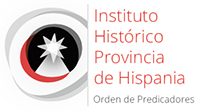Obispos Dominicos en Portugal y su imperio (Siglos XVI-XX)
Keywords:
Obispos dominicosAbstract
Resumen: En este trabajo presentamos un total de treinta y ocho frailes dominicos que fueron obispos residenciales en diócesis de Portugal y de las Misiones portuguesas a lo largo de la Edad Moderna y Contemporánea, incluyendo Brasil hasta su independencia: desde Bernardo da Cruz, prelado de Sâo Tomé (1540-1553), hasta Francisco Rendeiro, Ordinario del Algarve (1952-1965) y de Coimbra (1965-1971). La mayoría de ellos ocuparon Sedes ultramarinas, pues en general los religiosos estaban más dispuestos que el clero secular a residir personalmente en ellas.
Asimismo, consignamos los escritos de cada uno de los mitrados.
Abstract: The present paper examines a total of thirty eight Dominica friars who were residential Bishops in dioceses of Portugal and the Portuguese missions along the Modern and Contemporary Age, including Brazil uo to his Independence: from Bernardo da Cruz, prelate of Sâo Tomé (1540-1553), up to Francisco Rendeiro, Bishop of the Algarve (1952-1965) and of Coimbra (1965-1971). The majority of they occupied ultramarine Dioceses, since in general the religious ones were readier than the secular clergy to reside personally in them. Likewise, we record the writings of each one of the Bishops.
Downloads
Published
How to Cite
Issue
Section
License
Authors who publish with this journal agree to the following terms:
- Authors retain copyright.
- The texts published in this journal are – unless indicated otherwise – covered by the Creative Commons Spain Attribution 4.0 licence. You may copy, distribute, transmit and adapt the work, provided you attribute it (authorship, journal name, publisher) in the manner specified by the author(s) or licensor(s). The full text of the licence can be consulted here: https://creativecommons.org/licenses/by/4.0/.
- Authors are able to enter into separate, additional contractual arrangements for the non-exclusive distribution of the journal's published version of the work (e.g., post it to an institutional repository or publish it in a book), with an acknowledgement of its initial publication in this journal.
- Authors are permitted and encouraged to post their work online (e.g., in institutional repositories or on their website) prior to and during the submission process, as it can lead to productive exchanges, as well as earlier and greater citation of published work (See The Effect of Open Access).






